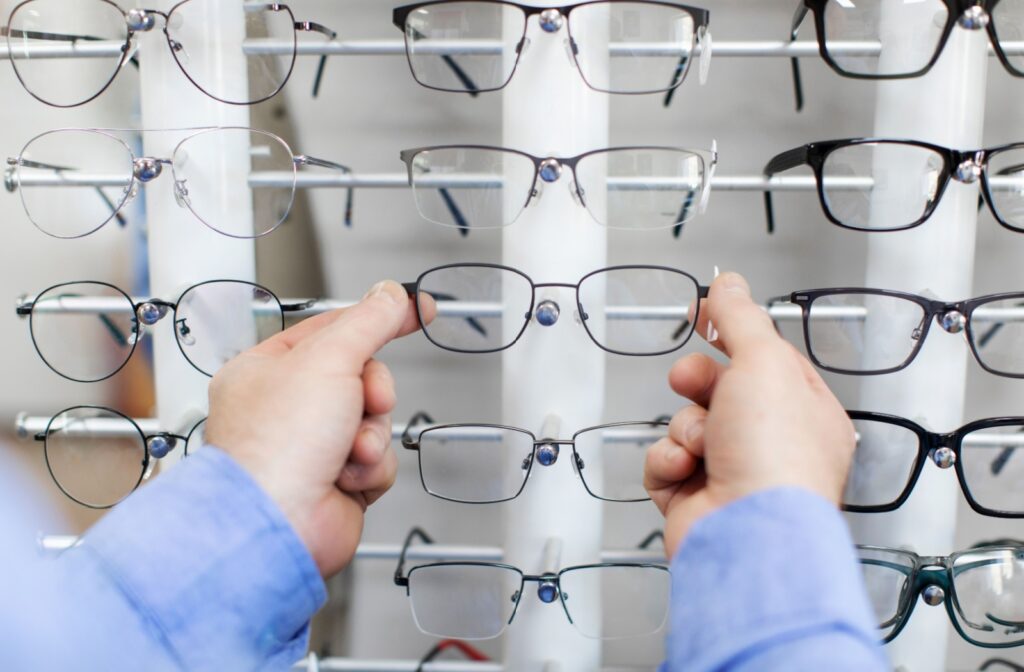Wearing glasses is meant to improve your vision and make everyday tasks easier. But when your prescription is too strong—even slightly—it can do the opposite. Glasses that are overcorrected can cause eye strain, headaches, dizziness, and difficulty focusing, especially when reading or using screens.
Whether it’s the result of an outdated prescription, a measuring error, or borrowing someone else’s glasses, wearing lenses that don’t match your vision can leave you feeling uncomfortable and disoriented. That’s why accurate eye exams and properly fitted glasses are essential for clear, balanced, and comfortable vision.
What Does “Too Strong” Mean?
When optometrists refer to a prescription being “too strong,” they mean the lenses are correcting your vision more than necessary. This can apply to nearsighted (minus lenses), farsighted (plus lenses), or astigmatism corrections.
A strong prescription isn’t inherently bad—it may be perfectly appropriate for someone with significant refractive error. But if the lens power exceeds what your eyes actually require, it can create visual distortions and discomfort.
Common Signs Your Glasses Are Too Strong
Wearing an incorrect prescription can cause symptoms that range from mildly annoying to seriously disruptive. Some of the most common signs include:
- Eye strain or fatigue
- Headaches, especially after screen time or reading
- Dizziness or feeling off-balance
- Blurred or distorted vision
- Difficulty focusing on nearby objects (especially with progressive lenses)
- Nausea or motion sickness-like symptoms
These symptoms often appear shortly after starting to wear new glasses but can persist if the prescription isn’t corrected.
How Over-Prescription Affects Vision
Eye Strain & Headaches
When your lenses are too strong, your eyes must work harder to adjust and compensate. Over time, this constant effort can lead to sore, tired eyes and tension headaches—especially around the temples or behind the eyes.
Difficulty with Depth Perception
An overpowered prescription can throw off your depth perception, making it harder to judge distances accurately. You might find yourself misjudging steps, bumping into corners, or feeling unsteady while walking.
Visual Distortion
Some people describe vision through too-strong lenses as “wavy,” “over-sharpened,” or “off.” Letters may appear overly crisp or distorted, which makes reading uncomfortable or disorienting.
Focus Issues at Different Distances
A common issue with overly strong prescriptions—particularly for farsightedness or those using progressive lenses—is struggling to shift focus between near and far distances. Your eyes may feel like they’re “snapping” between focal points, leading to fatigue and frustration.

Can Wearing Glasses That Are Too Strong Damage Your Eyes?
The good news is that wearing a prescription that’s too strong won’t permanently damage your eyes—but that doesn’t mean it’s harmless.
In children, wearing the wrong prescription during development can affect visual skills, so pediatric prescriptions should always be carefully monitored.
In adults, the primary concern is chronic discomfort, disrupted vision, and reduced quality of life. Prolonged use of ill-fitting glasses may discourage wear altogether, leaving you squinting or struggling unnecessarily.
Why You Might End Up With the Wrong Prescription
Outdated Eye Exams
Your vision can change more gradually than you realize. If it’s been over a year since your last exam, your prescription may no longer be accurate—even if your glasses still “sort of” work.
Incorrect Measurements
In some cases, prescription errors result from miscommunication, incorrect lens fabrication, or an inaccurate measurement during the exam. It’s also possible for issues to arise during the lens fitting process, such as the wrong pupillary distance (PD) or incorrect frame alignment.
Off-the-Shelf or Borrowed Glasses
Reading glasses from a pharmacy can work temporarily, but they don’t account for individual differences in each eye, astigmatism, or pupillary distance. Similarly, wearing someone else’s glasses—even if they seem “close enough”—can lead to serious eye strain over time.
Importance of an Accurate Eye Exam
An annual comprehensive eye exam doesn’t just detect vision changes—it helps ensure your prescription matches your current needs.
During a proper exam, your optometrist will:
- Evaluate your visual acuity
- Measure how your eyes focus, move, and work together
- Check for signs of eye diseases or conditions
- Test your prescription using precise tools and multiple comparisons
- Consider your lifestyle needs (e.g., computer use, reading, driving)
This personalized approach is essential for creating lenses that feel comfortable and enhance your daily activities—not hinder them.
The Role of Proper Frame Fitting
Even with a perfect prescription, poorly fitted glasses can still cause discomfort. If the lenses sit too high, too low, or too far from your eyes, the optical center of the lens won’t align correctly—leading to symptoms similar to wearing the wrong strength.
An optician will:
- Adjust the frame to sit correctly on your face
- Align the optical center of each lens with your pupils
- Ensure proper tilt, spacing, and comfort
- Help you choose lenses that suit your prescription (e.g., thinner lenses for higher corrections)
This attention to detail makes a major difference in how your glasses feel—and how well you see.
When to Recheck Your Prescription
If you’re wearing new glasses and still experiencing discomfort after a few days, it’s worth reaching out to your optometrist. Mild adjustment periods are normal, but persistent symptoms could signal a problem with your prescription or lens alignment.
You should also schedule an eye exam if:
- You experience sudden vision changes
- Your current lenses no longer feel comfortable or effective
- You get frequent headaches or eye fatigue
- You’re struggling to read or focus at different distances
Clear Vision Starts with the Right Prescription
Wearing glasses with a prescription that’s too strong can leave you feeling off-balance, tired, and frustrated. While it’s unlikely to cause permanent harm, it can significantly affect your comfort, productivity, and quality of life.
The key to avoiding these issues is regular eye exams and working with experienced professionals who take the time to understand your vision needs and ensure your lenses are just right. This helps prevent your vision from getting worse and ensure that your eyes are healthy.
Experience the Total Vision Difference
At Total Vision Richmond in San Diego, CA, our team is here to help you see clearly and comfortably—with personalized eye exams, precise prescriptions, and helpful frame fitting. If your current glasses aren’t working for you, don’t settle for less than perfect vision.
Schedule an appointment with us today and experience the difference accurate care can make.


